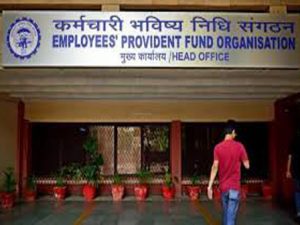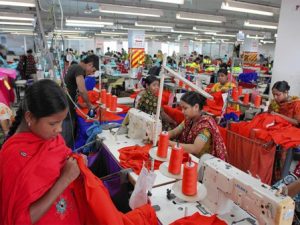EPF Concession: Will This Really Benefit Any Worker?
Nationwide lockdown for 21 days due to COVID-19 pandemic leaves many poor people grim about the question of their livelihood. Here are some cases of stark realities of the Employees Provident Fund (EPF) beneficiaries.

Bhuwaneswari, a millworker, was very happy when she heard the announcement by Nirmala Sitharaman, Finance Minister, on concessions for provident fund subscribers. The government has announced that it would pay the EPF contribution both of the employer and the employee (12 per cent each) for the next three months, and employees are allowed to withdraw 75 per cent of the fund from Provident Fund (PF) account subject to certain conditions. The government stated, “This will benefit 4.8 crore workers who are registered with the EPF.” Bhuwaneshwari thought that this is applicable to all workers. She did not read the small prints. The government has put two conditions. First, the concession is available to the establishments with up to 100 employees. Second, among those employees, 90 per cent should be drawing less than INR 15,000 monthly salary. These conditions make the mill where she works ineligible. The mill has more than 500 workers, although, most of them earn less than INR 8,000 per month, she is disappointed.
Bhuwaneshwari’s neighbour from the same village, Priya, works for a small mill, which has about 50 workers. Priya’s monthly wage is INR 7,200 only, which makes her eligible for the concession, but she is not an EPF subscriber. Priya said, ‘Ours is a small mill. The mill does not encourage us to avail of this benefit’. Priya was one of the 21 workers interviewed by Vaanavil, a grassroots-based research team in Dindugal, Tamil Nadu. However, 20 other workers are EPF subscribers, but they all work in companies where the number of workers is more than 100, which makes them ineligible. None of these 21 workers would be benefitting.
Also Read : Migrant Exodus During The National Lockdown
We discussed this finding with Rajeshwari, who is also a member of Gethu, a workers’ think-tank, to find out how impactful the scheme would be. She said, ‘PF benefits become applicable only if workers get the salary. So far, none of the workers, who receive weekly or monthly wages, have received any wage. The company has not informed them whether they would even receive any wage for the lockdown period’. Another worker, Koushalya, when asked whether she would demand salary from the company for the lockdown period, she said, ‘Workers are not in a position to even raise any skirmish against the company because they know they have to go back to the company for the job anyway. For the sake of a few days wage, no one would like to lose the job itself’. There was despair, when she asked,
‘How long this lockdown would continue? I do not think the mill would pay anything for free. We do not have even one day of paid leave. Salary gets deducted whenever you take off’.
The workers are hopeful that they would be able to take benefit of the other order from the EPFO. Employees affected by coronavirus lockdown would be now allowed to withdraw 75 per cent of fund accumulated in PF account or three months salary (whichever is lower) as advance from the PF account after one month of unemployment and keep its account with the EPFO active. However, among the 21 workers interviewed, most of the PF subscribers do not have or remember their user name and address. Further, they told that the mobile number linked to the PF account is often not that of the worker but of the finance person of the company. Rajeshwari said, ‘Workers do not know how to access their PF account, and thereby claim PF advance. We hope that the company would facilitate this process of taking an advance. But for that, we have to wait until the lockdown is over’. Rajeshwari added, ‘If the lockdown situation continues, they would need credit support for even fulfilling basic needs. Already, a number of workers are going to moneylenders. There is a worry that some of these workers would get into the bonded situation’.

Arockiaraj, the supervisor in one of the local mills and another member of Gethu think-tank, said, ‘Workers of large mills deposit PF subscriptions, but they would have more than 100 workers, and workers of small mills are not EPF subscribers. Who is going to benefit from this? The government, if serious, should make this concession applicable to all workers receiving a monthly salary less than INR 15,000. This will benefit both worker and company in the next three months’. Rajeshwari suggested, ‘The EPFO may try to find out names of such companies that have deducted EPF for the month of January 2020 and have not done for the subsequent months or have deducted less for subsequent months. It would then be clear that such workers have not received wages for their lockdown period. They should send instructions to these companies’.
Rajeshwari, however, added, ‘The companies are not regular in depositing their EPF subscription. The penalty seems to be the same if the delay is of one month or three months. Further, they deduct EPF for a very small proportion of millworkers’. EPFO is sending a regular message that states, ‘In view of our Hon’ble PM’s appeal, EPFO urges all its establishments not to cut salaries or resort to layoffs of their employees, unable to work due to Covid-19 or lockdown’. Priya asks, ‘Will companies listen to appeals and urges of the Prime Minister? Does that mean there is no law or regulation that binds companies not to cut salaries? Is it not just eyewash?’ It is a pity that the governance at the time of lockdown is built on appeals and requests from the government, rather than clear regulations. Does the government really believe that this would work or this is just another sedative for the unorganized citizenry?
Dindugal district in Tamil Nadu is known for spinning mills. It is in the middle of the supply chain of ready-made garments, which begins from cotton farmers to the stitching and packaging companies. The entire supply chain is affected. The mill-owners are also affected. These are challenging times for everyone, but workers definitely have no other ways of earning a livelihood.
Also Read : Appeal For Free Testing And Free Treatment For Covid 19 Letter To Pm Modi
More than 170 years ago, Marx said, ‘In general, we should observe that in these cases where worker and capitalist equally suffer, the worker suffers in her very existence, the capitalist in the profit on his dead mammon’.
The workers are badly affected. At the top of the supply chain are the top garment brands; most of them are global ones. It is important that the pressure to deliver wages to contract workers in the supply chain is faced by the brands. Does anyone have any mechanism to ensure compliance at the supply chain? There is a need for the government to immediately have a dialogue with these industry giants and bring some regulations.
(PS: Partners in Change and Praxis Institute for Participatory Practices, along with National Alliance Group for Denotified, Nomadic and Semi Nomadic communities (NAG), Vaanavil Research Collective (VRC) and Krishnagiri Development Programme (KDP) have initiated a Coronavirus Relief Package—Voices from the Margins Series to support communities at margins to access the government and non-government relief programmes to fight with Covid-19.Vaanavil research collective promotes rapid community-based study to inform narratives and policies related to communities at the margin. There is continuous and ongoing support to workers from 20 villages in one block of one district in Tamil Nadu. Vaanavil is a PiC project, supported by Freedom Fund. The names of some of the workers have been changed to protect their identity.)
